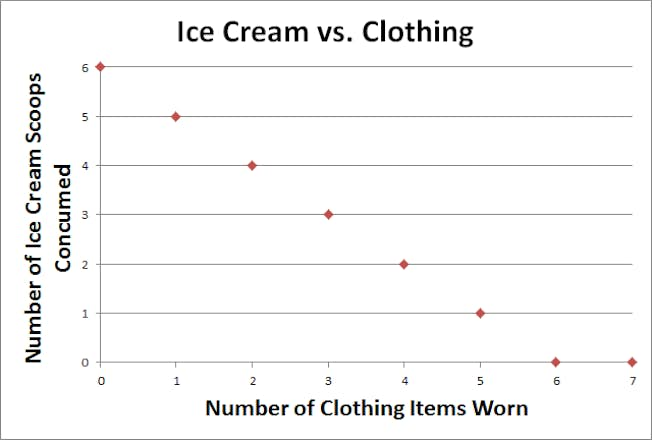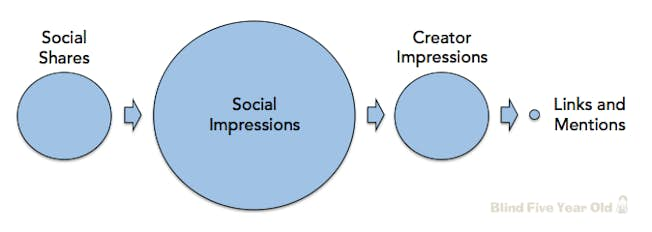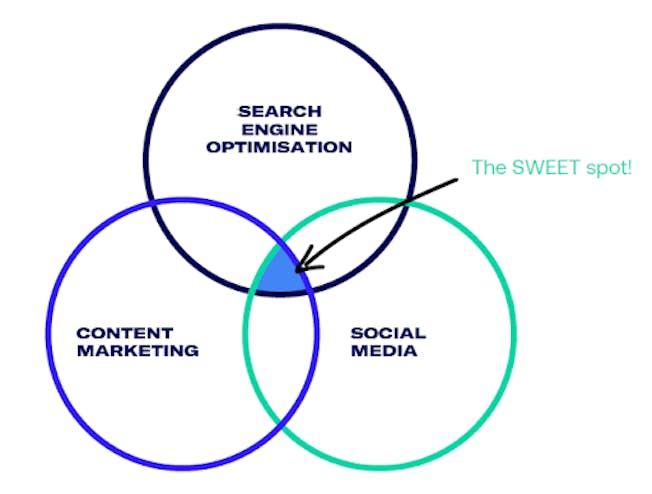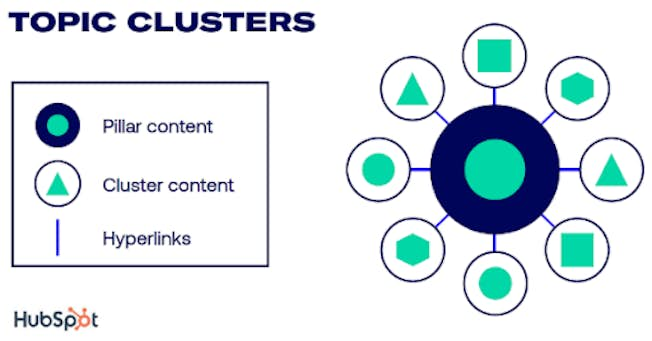Jun 1, 2022
5 Ways to Maximize SEO and Social Media
Search Engine Optimization (SEO) plays an important role in any digital marketing strategy as it helps people find your content. The higher your content ranks on the SERP (search engine results page), the more visitors it will attract.
Social media marketing has become another highly effective way to drive people to your website. And all of this depends on having an effective social media strategy that drives brand awareness and ROI. The sweet spot in a digital marketing campaign is ensuring that your social media, content marketing, and SEO strategies complement each other.
In this article, we’ll help you understand the complex relationship between SEO and social media, and offer 5 tips on how you can maximize both.
Does Google look at social signals?
Social signals are actions such as likes and shares on social media. So, if your content generates a lot of social signals, will this improve its ranking on Google? Well, Google has been giving mixed signals about this over the years.
In 2010, the search engine giant regarded social signals as a ranking factor, with a focus on quality over quantity. This means that Google looks at the reputation of the author or creator on social media sites to determine ranking.
However, in 2014, Google decided to no longer rank these social signals: in other words, likes or shares cannot be used to boost your rankings from an SEO perspective. However, that doesn’t mean you should abandon your social media strategy as it’s an important part of any digital marketing campaign.
Ultimately getting a good search engine ranking is about getting high-quality backlinks from reputable sources. Shares on social networks can also help get your content seen by a new audience.
Pro tip: Check out our article on how to generate backlinks to your websites.
However, that’s not the complete story…
The ice-cream experiment
In a famous blog post, AK Kohn investigated whether social signals cause higher SEO rankings, or just correlate with them. He used the example of ice cream scoops. The chart below would seem to indicate that increases in ice cream sales are caused by people wearing fewer clothes!

The cause for this is the warm weather. The ice cream sales and clothes are just correlated.
But, what do ice cream sales have to do with social media and SEO? When you have social shares, you then get more social impressions or views. Some of these impressions might be social content creators, who then link to or mention your site, resulting in a higher SEO ranking.
Suppose you write a blog and 100 people tweet about it. As a result, 10,000 more people then view your blog. That’s an impressive reach! However, of these 10,000 people, suppose 100 are social media content creators. Some of these creators may then link to your blog. And what do quality backlinks lead to? Higher SEO rankings!

So, even though Google doesn’t recognize tweets and shares, it does recognize the backlinks that result from those shares. Also, don’t forget that your social media profiles do turn up on SERPs!
Using social media to gain backlinks
What does all this complicated history tell us about social signals today?
- Social signals matter: Content that gets shared a lot gets seen a lot.
- Social signals lead to backlinks: Content that is seen by influential social media creators leads to backlinks.
- Backlinks improve SEO ranking: Content with more backlinks ranks higher on Google.
It is the backlinks, not the social signals, that improve SEO ranking. Building the right following, which includes creators, has a significant impact on the number of backlinks you can expect to develop via social media.
The best way to get backlinks (hopefully of high-quality) is to:
- Build link-worthy content that informs. This includes guides, blog posts, and topic clusters that attract links naturally.
- Build a social media following on channels to promote link-worthy content.
- Links from social media sites (Facebook, Twitter, LinkedIn, and so on) tend not to directly influence SEO but can indirectly benefit it. Your content will get more exposure and re-shares, and some of those people, such as journalists, bloggers, and influencers, may pick up your content and link to it from their sites
- Promote content through email, push notifications to subscribers, and social media.
- Outreach content to key influencers.
- Research competitors’ backlinks using a tool like Ubersuggest.
How to integrate SEO and social media
As with any SEO or social media strategy, content is a key element of how successful your overall strategy is going to be.
Finding the sweet spot
The sweet spot is where your SEO, content marketing, and social media strategies come together to complement each other.

You can reach this sweet spot by creating great content that informs such as:
- Blogs or articles - check out these great tools and templates for successful blog posts
- Guides - these can be how-to guides or eBooks
- Videos, video stories, live video
- Podcasts (with transcripts)
- Infographics - here are some tools to help create infographics
- Video podcasts
Pro tip: Don’t be daunted if this seems like a lot of work! You can reuse and repurpose content in different media. For example, a blog post could be the basis of several infographics or a long video can be chopped up into small video stories. Check out this article on how you can repurpose graphics for social media posts.
Topic clusters
Topic clusters are a great way to structure your informational content and incorporate SEO writing into your content mix. Essentially, you have the main topic and several sub-topics branching out from it. For example, your main topic might be about social media marketing, and you could then have some sub-topics about marketing on different social media platforms.
In topic clusters, the main topic is called the pillar content. And the sub-topics are the cluster content. When structuring your content, be sure to use hyperlinks between your pillar and cluster content.

Tailor your content
Think about what stage of the journey your customers are at so you can nurture them in the funnel. Informational content is most important at the top when generating awareness and interest. People aren’t ready to make a buying decision yet. The closer the person is to making a buying decision, the more important transactional content becomes. This is where you make the conversion process as smooth as possible for customers.
A common mistake is to focus solely on transactional content. If your social media channels are all asks and promotions, you won’t build the following that you want. It’s harder to gain a good SEO ranking if you’ve just got transactional content.
So serve first (with informational content) and sell second (with transactional content). This makes the content more appealing to both Google and social media!
Open graph meta tags
Open graph meta tags make your snippets more visually attractive on social media and more likely to be read and shared.
You can use opengraph.xyz to preview how your content looks when shared on social media and generate the meta tags that you need to add to your website. (You may need an additional plugin to add open graph meta tags, such as RankMath).
5 Tips to Improve Your SEO for Social Media
As we’ve explained, in most cases, social media sharing doesn’t directly impact SEO. However, when you share your content on social media, it can influence SEO in these ways:
- Drive organic traffic
- Increase visibility
- Improve local SEO
- Expand content reach
- Enhance brand recognition
- Increase backlinks
So how can you improve your SEO for social media?
1. Work on Your Profile
Remember that your social media profile is one of the first things a prospect or customer will see, so take time to craft one that’s engaging and reflects your business.
- Include as many details as possible so you give a good picture of what your business does
- Use keywords that are relevant to your brand and searched words or terms
- Have backlinks to your site content to drive traffic
For B2B, LinkedIn is a very powerful social media network, so check out how to leverage its power. Or if you use a personal account, here are practical tips to improve your profile
2. Have quality shareable content in your social channels
There are many platforms and accounts for customers to choose from so you need to make the most of your content to attract and engage. Use a variety of content types such as videos, blogs, testimonials, etc. to get an idea of what works for your audience.
Also, use good imagery that’s tied to your brand so that when people see it they recognize it as yours. This will increase brand awareness and recognition.
3. Encourage backlinks through good content
People will only share content that they believe is good or relevant to their audience. So it’s worth prioritizing quality over quantity if resources or time is an issue.
Take time to research topics and include high authority research and third-party links alongside internal links to show authority. Quotes are also good to include from industry experts or statistics that back up your point of view.
Above all, adopt a tone and opinion on your industry as that will help you become an industry leader.
4. Use social listening to see what’s going on out there, with your competitors and others
Social listening is a powerful SEO tactic and there are a few great free tools out there you can use. These will help you to monitor conversations to see what your audience is saying about you and also keep track of your competitors.
As people turn to social media more and more to ask questions, read reviews (and complain), keeping a close ear on your platforms is a good idea for managing online reviews and overall customer service.
5. Pay attention to influencers and consider using them
As you probably already know, influencers have sway on social media. You just need to look at the influencer stats to see how much.
You don’t need to aim that high for your influencer marketing strategy, but if you know of influencers in your sector or area that your audience listens to then it may be worth considering using them in your social media.
Smash Your Social Media Campaigns with SEO
Things can change quickly in the world of SEO, so you need to keep on top of trends and developments to keep up. DMIs Professional Diploma in Search Marketing will not only teach you the fundamentals but dive into the different social platforms so you know how to use each one effectively. Enroll today to become a search expert that drives traffic and leads!
Related
Upgrade to Power Membership to continue
your access to thousands of articles, toolkits, podcasts, lessons and much much more.
Become a Power Member- Login
- View Courses
- - - -
- Courses
- Resources
- - - -
- My Account
- Change Password
- Logout





